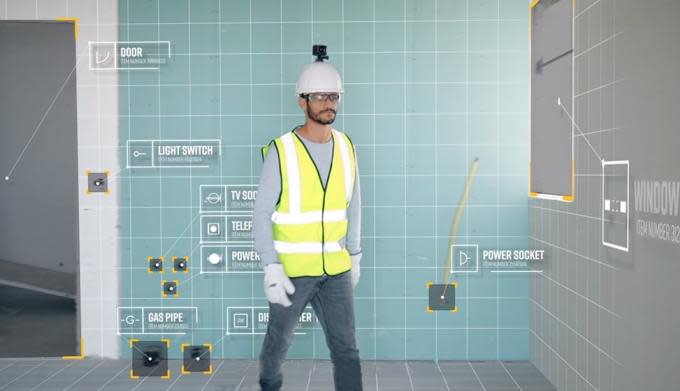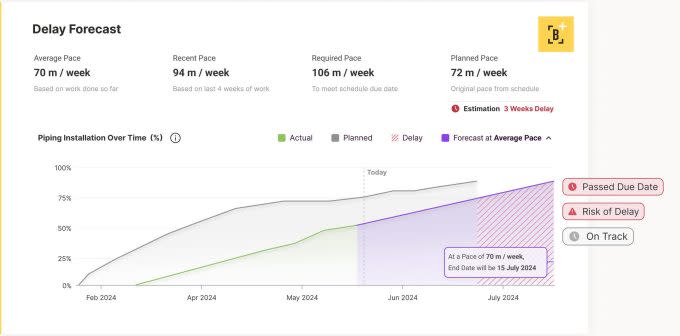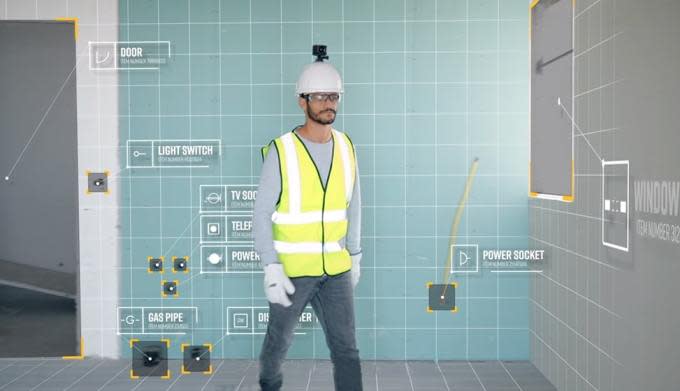Intel could be giving its burgeoning foundry ambitions a much-needed shot in the arm, as the chip giant’s venture capital arm today revealed that it’s making a “strategic” investment in an Israel- and U.K.-based AI construction startup.
Intel Capital is leading a $15 million investment into Buildots, a company that uses AI and computer vision to create a digital twin of construction sites. The six-year-old company works with construction giants such as Pomerleau, NCC and Ledcor, serving them with 360-degree cameras to regularly capture on-site data to track project progress, identify bottlenecks and optimize workflows.
Buildots had previously raised around $106 million, with its most recent $60 million tranche coming two years ago.

While Intel Capital has plowed billions into AI startups through the years, its decision to buy a stake in Buildots is particularly notable right now, coming as its parent company doubles down on efforts to increase its own manufacturing capacity — while trying to keep costs in check.
A few years back, Intel revealed plans to invest $20 billion in two new fabrication facilities (or “fabs”) at its Ocotillo campus in Arizona. At the same time, Intel also launched a new foundry business — recently rebranded as Intel Foundry — with a view toward manufacturing chips designed by other companies.
These two new Arizona factories, dubbed Fab 52 and Fab 62, are expected to hit completion by early 2025. But they are among a number of massive construction projects Intel has on the go around the world right now, including plans for two new plants in Ohio that could cost up to $28 billion. These were originally expected to start bearing fruit in 2025, though the company recently announced it would have to delay these plans by a year, citing “market challenges.”
Efficiencies
So Intel is something of a construction powerhouse, with its current spend across four U.S. states alone pegged at around $100 billion spanning new builds and refurbs. Pressure is mounting, though, as its recent earnings showed that its Foundry business losses widened last year, while the company faced another setback when regulatory hurdles forced it to pull the plug on a $5.4 billion merger with contract chipmaker Tower Semiconductor. (The pair instead struck a commercial partnership that will see Intel provide foundry services to Tower as part of a $300 million investment.)
To help with these various manufacturing endeavors, Intel is also set to receive $8.5 billion in government funding as part of U.S. plans to bring more chip manufacturing “in-house,” as it were.
However, one of the best ways to cut costs is to improve efficiencies, which is where Buildots could help. Just recently, the company launched a new AI-powered “delay forecast” feature that claims to predict when delays might occur to help project managers take preemptive action.
Buildots said at the time of the launch that during beta testing on major construction sites, the delay forecast feature was able to reduce delay times by up to 50% in some scenarios.

Historically, the construction industry was always deemed to have been slower than most to embrace digitization. This is in part due to the complexity and unique nature of each project, as well as the multi-stakeholder coordination required, spanning architects, contractors, engineers, suppliers, regulators and more. But there are signs that this is changing, particularly with the advent of AI, which — while unable to build a tower block — is showing some promise in terms of helping to reduce timelines on the operational side.
Neither Intel nor Buildots would directly confirm whether they are already working together, though Buildots has alluded to this on social media in the past with references to collaborations with “industry giants like Intel.”
In a statement issued to TechCrunch, Intel Capital’s investment director Lisa Cohen said that Intel’s own experiences in the construction realm have helped it understand the need to drive efficiencies through technology.
“Intel’s first-hand experience building some of the largest and most complex construction projects in the world has certainly played a role in leading us to appreciate the tremendous potential AI technology in general, and Buildots specifically, holds — in terms of revolutionizing construction process management and driving efficiency to new levels,” Cohen said.
As a result of the investment, Cohen will now be joining Buildots’ board of directors. Other investors in the round include Israel’s OG Tech Partners among other unnamed previous investors.
EMEA Tribune is not involved in this news article, it is taken from our partners and or from the News Agencies. Copyright and Credit go to the News Agencies, email news@emeatribune.com Follow our WhatsApp verified Channel





